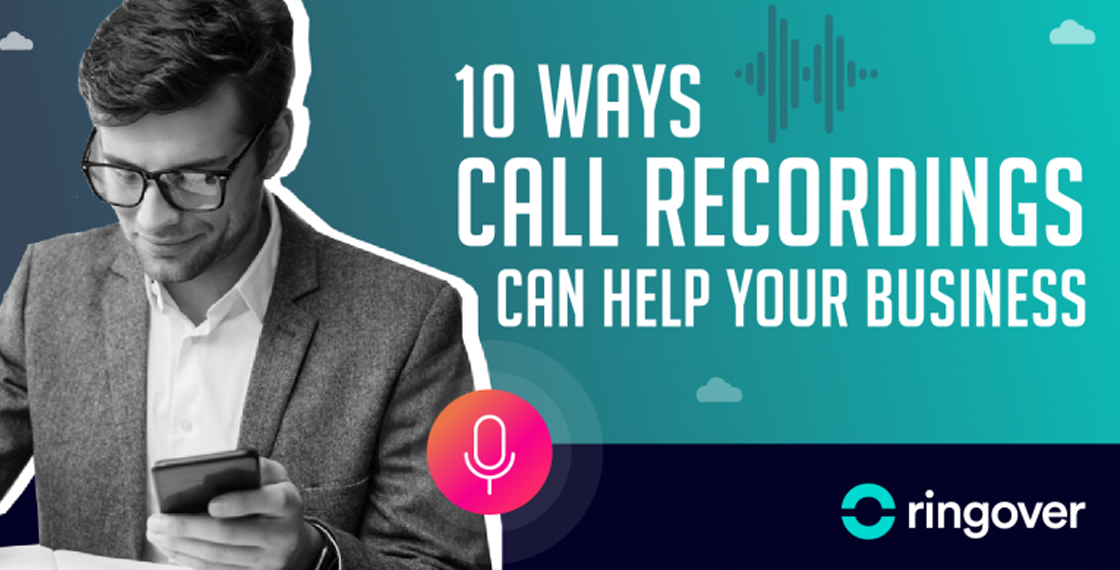Summary
There are very few companies that aren't constantly seeking ways to improve their operation - whether that improvement involves getting sales numbers up, simplifying team collaboration, retaining customers or simply ensuring that every level is being run optimally. No matter the areas of your call centres you want to improve, recording your calls is a highly effective way to see changes for the better across the board.From training customer service representatives on how to better handle tricky situations they may encounter over the phone to letting new agents hear veterans upsell valued clients and pinpointing exactly where dissatisfaction lies among your clientele, call recording can go a long way toward maximising profit, minimising employee turnover and keeping clients loyal. The following article will explain further how your company can get the most out of this powerful tool and highlights :
A brief history of the recorded call

Voices on the phone have been recorded now for well over a century, starting with the wax disc device patented by Theodore and Carl Freese in 1903, which served as a call answering mechanism for absent recipients. This first "answering machine" never quite gained commonplace status, as it was difficult to use and had limited recording capacity, but the intention behind its creation spurred new developments over the years. The original wax disc recorder was replaced by tape recorders in the 1930's, which used magnetic tape to make and store recorded sound. Numerous versions of answering machines that recorded callers' voices on tape were developed over the following decades - each smaller, more user-friendly, and with greater recording ability than the last. These were widely used in call centres up until the end of the 20th century, when digital call recording began to take over. This type of call recording is still being developed to this day, employing such capabilities as CTI (computer-telephony integration), which syncs information in a computer system with a company's telecom, and storage of a much greater volume of data for longer periods of time.
10 benefits of call recordings
To simplify things, we've listed below 10 of the most immediate advantages of recording calls in your call centre:
1. Identify problem areas
Knowing exactly what your agents are saying to clients over the phone as well as how they're saying it is the best way to pinpoint potential communication issues within your phone support on both the individual and group levels. Being aware too of exactly how clients are responding to certain phrasing or communication styles can be useful for modifying scripts that your agents use, which will ultimately increase client satisfaction. For example, instead of asking callers, "What issue are you currently experiencing?" it could be preferable for your agents to ask, "How may I help you today?" The way that agents are being trained to pitch certain products or services can be revisited too if you find that very few clients are signing on for them.
2. Keep detailed records
Recorded calls archived in your call centery CRM or other information system can be useful for verifying stored client information. Thanks to CTI, recorded calls can be automatically stored in the appropriate client file without requiring the agent who took the call to go searching through the system to manually save the sound file in the right place. It can also aid sales campaigns by allowing agents to refer back to precise details of previous conversations: "Since you told us you were very happy with product/service X last year, our new offer will likely be of interest you…"

3. Recover overlooked/missed details
The ability to go back and listen to a certain client's archived calls can be extremely valuable, if ever a situation arises involving confusion over a client purchase, for example. Let's say you run a customer service call centre for a pool company, and a client insists that the on-site technician installed the wrong type of pump for their water filtration. Though your records may indicate that this is the precise product they ordered, your support manager can go back and listen to all previous exchanges between the client and the last agent to find the exact source of miscommunication to more readily find a solution.
4. Quality assurance
Recorded calls allow general client satisfaction levels to be gauged, and the quality of the assistance that your customer support is providing by phone to be evaluated. This will in turn permit you to effectively tailor IVR greetings and on-hold announcements as well as scripts for your agents in all departments. Informing callers that their calls are being recorded also contributes to a feeling of transparency, assuring clients that their personal information is only being used in their best interests.
5. Continuous improvement
Recording your calls is a highly effective way of "taking the temperature" of your phone support, keeping you constantly aware of client satisfaction levels, recurrent problems, and the strengths and weaknesses of your staff. Hiring the best employees is just the first step to delivering great service. You must put systems in place to easily track and identiy key areas for improvement—time after time. Whatever the path you choose to take to improvement, using call recordings can help ensure the steps you take have high impact on your call centre performance.
6. Provide agents with valuable feedback

The training of employees in charge of call processing will be much more effective if both a manager and an agent can listen to a previous call together and discuss its positive and negative aspects in detail. Agents who may be struggling can listen to their own calls repeatedly and learn to recognise potential pitfalls (avoiding getting flustered when a caller raises his or her voice, for example) as well as things they're doing right (such as asking if there is anything else they can help with before hanging up). New agent recruits able to listen to their highest-performing colleagues' calls can gain valuable insight on cold-calling techniques as well as upselling loyal clients.
7. Enable product or service improvement

If dozens or even hundreds of callers a day are voicing similar complaints to your customer service, this is a red flag that your company needs to fix an issue as quickly as possible. Use recorded calls to see if there are specific areas of the product or service to be scrutinised - and if everyone is generally unhappy with it, consider pulling it entirely from your offerings.
8. Resolve agent-client disputes

Going back and finding the source of a disagreement can be especially valuable for resolving it. An agent who allowed a heated discussion to escalate may need to be pulled off the phones for some time while they receive extra training or evaluation. And even if the blame lies with the client in such a scenario, listening to contentious calls can help your management decide if it is best to salvage the professional relationship - offering rebates or free upgrades - or cut ties with the client entirely.
9. Improve marketing campaigns

Your marketing team, although not in direct contact with your clients, benefits tremendously from the opinions shared by your customers. By recording your calls with customers, your marketing and communications colleagues can review them to find out what are the pain and positive points of your ideal customer and to come up with creative ways to address them in their marketing campaigns. Marketers can also listen carefully to call recordings to pin-point keywords that customers are (or not) mentioning in order to better optimise their publications and online ad billing. Reviewing call recordings can help take the guesswork out of creating stellar marketing tools including target personas and punch lines for attracting the right audiences. Using calls to tailor your marketing campaigns can also be a powerful tool that helps you to effectively communicate and word things in a way that will resonate with your core audience.
10. Comply with legal standards
Although it may very well be discouraged or even illegal to do so in certain countries, some others may require by law that you record your company calls and retain these recordings for a certain amount of time. If ever a lawsuit or other type of litigation should arise from something said by or to one of your agents over the phone, your company could be required to release a recording of the call as evidence. And even if your country does not require you to do so, it is best to record all calls if you are allowed as a measure of protection in potential legal disputes.Whether you work for a start-up with only a handful of part-timers or employ 1,000 people in a multi-site call centre, your phone activity is likely an essential aspect of how you communicate with your client base, which means that you are responsible for making it the very best it can be. The Ringover solution will provide you with call recording capabilities worthy of the largest international corporations - and much more. So why not see what we can do for you?
Want to set up call recording for your team?
Contact our experts to help guide you step-by-step at +44 20 3808 5555 or send an email to sales@ringover.com. Start your free trial today.



